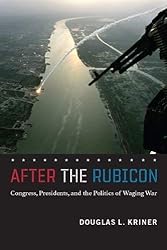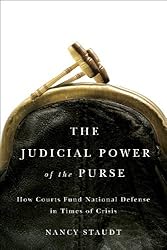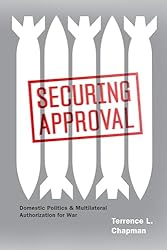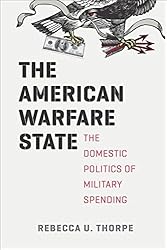Learn more
Your Memberships & Subscriptions

Download the free Kindle app and start reading Kindle books instantly on your smartphone, tablet, or computer - no Kindle device required.
Read instantly on your browser with Kindle for Web.
Using your mobile phone camera - scan the code below and download the Kindle app.

Follow the author
OK
Securing Approval: Domestic Politics & Multilateral Authorization for War (Chicago Series on International and Domestic Institutions) Illustrated Edition, Kindle Edition
Among the most momentous decisions that leaders of a state are called upon to make is whether or not to initiate warfare. How their military will fare against the opponent may be the first consideration, but not far behind are concerns about domestic political response and the reaction of the international community.
Securing Approval makes clear the relationship between these two seemingly distinct concerns, demonstrating how multilateral security organizations like the UN influence foreign policy through public opinion without ever exercising direct enforcement power. While UN approval of a proposed action often bolsters public support, its refusal of endorsement may conversely send a strong signal to domestic audiences that the action will be exceedingly costly or overly aggressive. With a cogent theoretical and empirical argument, Terrence L. Chapman provides new evidence for how multilateral organizations matter in security affairs as well as a new way of thinking about the design and function of these institutions.
- ISBN-13978-0226101217
- EditionIllustrated
- PublisherThe University of Chicago Press
- Publication dateJuly 24, 2012
- LanguageEnglish
- File size3.3 MB
Kindle E-Readers
- Kindle Voyage
- Kindle Paperwhite
- Kindle Touch
- Kindle Paperwhite (11th Generation)
- Kindle Paperwhite (5th Generation)
- Kindle Paperwhite (10th Generation)
- Kindle Oasis
- Kindle Oasis (9th Generation)
- All New Kindle E-reader (11th Generation)
- All new Kindle paperwhite
- Kindle (10th Generation)
- Kindle Oasis (10th Generation)
- Kindle Scribe (1st Generation)
- All New Kindle E-reader
- Kindle
Fire Tablets
Shop this series
See full series-
First 3$102.46
-
First 5$147.41
-
All 8$226.72
-
First 3$102.46
-
First 5$147.41
-
All 8$226.72
This option includes 3 books.
This option includes 5 books.
This option includes 8 books.
Customers who viewed this item also viewed
Editorial Reviews
Review
“Securing Approval is a fascinating and important study that provides fresh insight into the conditions under which governments solicit the approval of international organizations for foreign policy decisions.”—Edward Mansfield, University of Pennsylvania
-- Edward Mansfield ― University of Pennsylvania“A work of meticulous social science that will enhance readers’ understanding of the interaction of states, intergovernmental organizations, and domestic publics in the realm of international security.”
-- David Kinsella ― Portland State University“Why do leaders sometimes seek approval from international organizations when contemplating the use of force? Why does such approval matter? Chapman applies rigorous theory and systematic empiricism to these important questions and helps us understand the critical role of domestic politics in international security affairs.”
-- Alexander Thompson ― Ohio State UniversityAbout the Author
Terrence L. Chapman is assistant professor in the Department of Government at the University of Texas at Austin.
Excerpt. © Reprinted by permission. All rights reserved.
SECURING APPROVAL
DOMESTIC POLITICS AND MULTILATERAL AUTHORIZATION FOR WARBy Terrence L. ChapmanTHE UNIVERSITY OF CHICAGO PRESS
Copyright © 2011 The University of ChicagoAll right reserved.
ISBN: 978-0-226-10121-7
Contents
List of Illustrations................................................................viiAcknowledgments......................................................................ixIntroduction.........................................................................11 The Value of Multilateral Authorization...........................................192 Institutions, Member State Bias, and Information Transmission.....................373 Appealing to Multilateral Security Organizations..................................734 UN Authorization and U.S. Public Opinion..........................................1015 International Organizations and Coalition Building................................131Conclusion...........................................................................153References...........................................................................163Index................................................................................179Chapter One
THE VALUE OF MULTILATERAL AUTHORIZATIONAs noted in the introduction, history shows that governments have often sought the approval of international organizations when conducting foreign policy, at least since 1945 and the creation of the United Nations. This pattern of consultation is understudied, particularly given that the dominant paradigmatic approaches to international relations theory, especially the realist tradition, take sovereign authority and the quest for power and security as a predominant feature driving international behavior. Although states have not forfeited their right to make the final decisions regarding their own security, they have increasingly consulted multilateral, supranational institutions for authoritative statements regarding international conflict, which potentially opens the door for increased scrutiny, criticism, and opposition to their foreign policies. Existing paradigmatic views of international relations theory do not provide clear answers to why states would subject themselves to this scrutiny.
The UN Security Council is the largest and most prominent of multilateral, consultative security organizations, but regional organizations have fulfilled this role in a number of ways. At least since the writing of Immanuel Kant, philosophers, scholars, and policymakers have argued that international organizations and international law can act as a force for peace. International organizations are thought to socialize members to norms of "good behavior" and facilitate mediation and conflict resolution between states, all reasons for states to involve them in their disputes. But there are several reasons why approval seeking behavior is puzzling. First, despite arguments from advocates of strong international law, there is no clear legal obligation for states to "get a second opinion" or subject their foreign policies to scrutiny prior to action. Second, the organizations in question are frequently derided for lacking direct and robust enforcement power. States routinely act without the formal approval of an international organization but are rarely if ever punished, and compliance with multilateral security organization dictates and rules is very imperfect. Yet governments continue to behave as if getting approval is important and invest considerable effort to garner it.
Two recent and prominent examples illustrate both the legal ambiguity of IO authorization as well as the lack of effective punishment mechanisms, especially for powerful states. In 1999, the United States initiated a bombing campaign against Serbian forces operating in Kosovo. The campaign took place with the cooperation and consent of NATO allies, but was criticized by many as illegal because it was prosecuted without a mandate from the UN Security Council (Roberts 1999). Likewise, the 1984 invasion of Grenada was roundly criticized by the Organization of American States and its member states, despite the fact that the United States was granted authorization from the Organization of Eastern Caribbean States (Beck 1993). In both cases, the United States and its allies argued that they had the requisite legal authority to carry out the respective actions. In neither case did the United States suffer serious sanctions in response to their actions, although in both cases it behaved as if garnering some sort of formal "stamp of approval" from an international organization was important, even if to provide some thin veneer of political cover. To some degree, the legality of many such actions appears to be in the proverbial "eye of the beholder," in the sense that strict proponents of international law argue against the legality of actions receiving multilateral opposition, while proponents of such policies often argue that overlapping and somewhat redundant institutional authorization provides the necessary legal authority.
There are, of course, a variety of views on the importance and effectiveness of international organizations within broader international relations theory. This chapter examines some of these and makes the case for a more strategic theory of states' interactions with multilateral security organizations. First, I address the implicit "null hypothesis" of work on international security organizations, namely, the realist claim that multilateral security IOs matter little for state behavior because they lack direct enforcement power. This claim simply does not match the evidence, in that states invest a considerable amount of effort to get the approval of these so-called "meaningless" organizations. Perhaps more importantly, this view neglects more indirect mechanisms of influence, such as the channel of public opinion. Because public support at home and abroad helps states accomplish their broad goals, compliance with institutional edicts may have more to do with the accompanying political benefits rather than with the strength of enforcement power.
Second, I assess the legal status of UN Security Council authorization as well as other international organizations. Scholars have noted a general trend toward increasing legalization in international affairs, pointing to developments in international dispute settlement and international human rights law (cf. Goldstein et al. 2000; Keohane, Moravscik, and Slaughter 2000; Abbott et al. 2000; Simmons 2000). As noted above, however, the legal status of authorization for the use of force is somewhat ambiguous, and although states frequently attempt to justify their behavior in legal language, the need for legal consistency is not a sufficient explanation for approval seeking (Voeten 2005). It is far from clear that increased legalization extends to the "high-politics" realm of security affairs, at least in so far as it applies to the need to acquire multilateral consent for foreign policies.
A third view, drawing inspiration from constructivism, is that IO approval matters because it provides symbolic legitimacy; indeed, even the act of consulting an IO may provide some legitimacy if it is seen as the procedurally appropriate thing to do (Hurd 2007). This view also does not fully explain the evidence, in that governments seem to pick and choose when they consult international organizations, and the legitimacy perspective does not explain considerable variation in the effects of institutional activity. This view is also vulnerable to a theoretical critique: if we only are able to know IOs are legitimate when states act as if they are it may be difficult to disentangle the true causal mechanisms underlying a legitimacy effect. In other words, legitimacy is defined by the very acts we hold up as evidence of a legitimacy effect, establishing a definition that may be difficult to falsify.
A fourth view, which I build on in chapter 2, is that IO activity can provide information to audiences that are important to governments. That is, IO authorization can provide valuable political cover for governments considering controversial and possibly threatening foreign policies. Not all IOs are equipped to provide this cover, however. The usefulness of multilateral organizations for political cover depends on the informational content of their decisions. This perspective helps explain the selectivity with which governments appeal to IOs as well as the varying effects of IO decisions. This view adds to and extends recent work in a rationalist tradition that locates the importance of multilateral security organizations in their ability to alter the incentive structures of governments (e.g., Fang 2008; Thompson 2006, 2009; Voeten 2005). Because IOs may influence domestic and international politics in important ways, their decisions can have important ramifications for the strategic behavior of states.
After reviewing these alternative explanations, I discuss domestic constraints on foreign policy and the interaction of IOs and domestic politics, as covered in the recent literature. In particular, it is useful to consider the state of scholarship on public opinion and foreign policy in order to assess whether it is plausible that the public can draw inferences from IO decisions that in turn influence the degree to which citizens support their leaders. Although this book relies on a view of the public as generally uninformed, it assumes a base level of rationality that is plausible given existing studies of political behavior.
ENFORCEMENT AND INFLUENCE
Ever since E. H. Carr's critique of the League of Nations and interwar multi-lateralists (1939), scholars that identify themselves as realists have tended to dismiss international organizations as important actors in world affairs. Perhaps most famously, Kenneth Waltz labeled IOs "epiphenomenal," referring to the idea that they simply represent the power and interests of important states (Waltz 1979). In writing in the mid-1990s, John Mearsheimer (1995) alluded to the "false promise" of IOs, reflecting substantial skepticism about the pacific effects of institutions. Notably, Mearshiemer pointed out that IOs should be least influential in the area of international security, since the primary goal of states is to preserve their own security. From this point of view, international organizations like the UN should have little effect on states' foreign policy behavior, serving rather as convenient window dressing for the enforcement capabilities of powerful states.
This view is certainly compelling, particularly given the history of global security institutions. The first truly large-scale attempt at collective security, the League of Nations, was formed in the aftermath of World War I with the goal of preventing future wars by mediating conflicts between states and facilitating collective responses to acts of aggression. The League was initially championed by President Woodrow Wilson, but the United States failed to join the League because of domestic isolationist sentiment manifested in Congress. Without the presence of the United States, who emerged after its late entrance in World War I as a rising superpower, the League Council was left with four permanent members: the United Kingdom, Italy, Japan, and France. Notably, the League Council operated on a unanimous voting principle, which gave the four permanent members and others veto power over initiatives. As a result, it was powerless to intervene in response to the major aggressors of the interwar period-Italy, Germany, and Japan—and its legacy demonstrates a futility that many attribute to the lack of independent enforcement capability. The failure of this early attempt led to Carr's critique (1939) of advocates of international law and organization as "utopian" and helped refocus scholarship on the strategic and material interests of statecraft, rather than on normative concerns.
At first glance the UN seems to be very similar in design to the League. In its early years, optimism about the new postwar organization resulted in some involvement in the affairs of superpowers, such as Council discussions during the 1948 Berlin Blockade. The Security Council authorized military action in the Korean War, although notably in the absence of Soviet representation, as the Soviets boycotted the 1950 session. The cold war reduced the ability of the council to intervene in disputes involving the United States or USSR, but in the 1960s and 1970s the council played a part in disputes in the Middle East, Africa, and Southeast Asia. Indeed, the distribution of Security Council resolutions over its lifetime is heavily skewed away from the five permanent members' areas of direct interest (Wallensteen and Johanssen 2004), and the general perception of the organization during the cold war was that it was paralyzed by the opposing vetoes of the United States and USSR, supporting the view that IOs are impotent in cases in which they do not possess the capacity to enforce their mandates. When great powers are aggressors, enforcement is unlikely, although some have noted that formal multilateral opposition can limit cooperation and raise the costs of conducting foreign policy, even for powerful states (Voeten 2005; Hurd 2007).
The end of the cold war ushered in a new area of optimism regarding multilateral cooperation in general and the Security Council in particular. The council achieved remarkable consensus in 1990-1991, authorizing the expulsion by force of Iraqi forces from Kuwait. The council also authorized a number of peacekeeping missions in the 1990s, as well as U.S. intervention in Haiti in 1994. However, mixed success in other cases throughout the 1990s weakened initial post-cold war enthusiasm. The 1999 circumvention of the Security Council by the United States in the Kosovo conflict, and the more unpopular decision in 2003 to conduct the Iraq War without explicit authorization, resulted in renewed charges of institutional impotence. Moreover, these events seemed to echo the claims of Carr and later scholars, who underscored the fundamental nature of state power and interests over institutions and international law.
The emphasis on enforcement that emerges from realist approaches to understanding international organizations has sound theoretical basis, even prompting scholars to assert the general principle that the "depth of cooperation" of any international agreement is proportional to the punishment required to maintain cooperation (Downes, Rocke, and Barsoom 1996, 385-87). In other words, the more an agreement or institution requires states to change their behavior, the stronger the agreement or institution's enforcement mechanism must be to ensure compliance. Combining this argument with Mearsheimer's insights, since no states are willing to forfeit their sovereignty over their security to multilateral institutions, and since those institutions lack enforcement power independent of the cooperation of states, most foreign policy behaviors in security affairs will go unpunished by multilateral institutions and, in turn, the presence of such institutions will do little to fundamentally alter state behavior.
The problem with this line of thinking is that there is an implicit assumption that incentives can only be altered by some hard punishment mechanism, but of course IOs like the UN rarely operate in this manner. The UN does establish some formal rules about appropriate uses of force and threats to international security, and the Security Council will routinely meet to discuss and debate alleged violations of these rules. However, the Security Council does not immediately dispatch a police force or fine the offending parties. Rather, it operates as a coordination mechanism for channeling state response (Voeten 2005) and it provides information to foreign (Thompson 2006) and domestic (Chapman 2007) publics. All of these mechanisms can, of course, alter incentives surrounding foreign policy, but are quite different than direct enforcement.
The realist focus on hard enforcement thus neglects some critical avenues of influence. As Voeten (2005) and others have pointed out, failure to obtain Security Council sanction can raise the costs of foreign policies by stimulating international opposition, and failure to obtain support from key domestic actors can make political life and the prosecution of successful foreign policy very difficult for leaders. Leaders consider these costs and craft their multilateral diplomatic strategies taking them into account. Assessing the magnitude of impact of these considerations on the aggressiveness or characteristics of foreign policy initiatives can be difficult, as it requires a counterfactual assessment of how policy might be aimed differently in a world without multilateral security organizations, but we can look for evidence of these mechanisms by examining domestic and international support for foreign policy initiatives under a range of circumstances.
LEGAL OBLIGATION
One alternative to the pessimistic realist view of IO influence in security affairs focuses on the increased legalization of the use of force in the twentieth century. Although the international system has seen an increase in highly legalized international institutions, such as the World Trade Organization or European Union, there is still considerable disagreement over the legal ability of organizations like the UN Security Council to limit the use of force. Moreover, practical design matters have prevented the UN and like organizations to establish, in practice, the ability to become neutral legalistic arbiters over the appropriate use of force.
Each state that is a signatory to the UN charter ostensibly agrees to the various provisions of the charter, including the Chapter VII stipulations about the use of force. However, there is little about UN Security Council decisions that resembles those of a legal institution (Voeten 2005). They rarely, for instance, rule on the basis of existing precedent or on the letter of the law. In fact, the law regarding what constitutes a "threat to international peace and security," as represented by the language in Chapter VII of the charter, is too vague to make Security Council action "automatic" in the event of a particular international event. Instead, the decision to take action in response to a threat and the degree of response is determined by member states, which, in practice, can be read as the permanent five members (P-5), who each possess a veto over resolutions of the Security Council. The fact that these five powerful states drive Security Council decisions means that Security Council behavior is inherently political. Unlike the highly legalized WTO dispute settlement mechanism, which is presided over by expert judges in international trade law, or other international regulatory regimes like the European Court of Justice, the Security Council is presided over by member states, who themselves usually have a stake in the response to an international event. Security Council decisions are not based on precedent or legal principles, but rather on the political interests of the voting members and their expectations about how policy outcomes will affect international order.
(Continues...)
Excerpted from SECURING APPROVALby Terrence L. Chapman Copyright © 2011 by The University of Chicago. Excerpted by permission of THE UNIVERSITY OF CHICAGO PRESS. All rights reserved. No part of this excerpt may be reproduced or reprinted without permission in writing from the publisher.
Excerpts are provided by Dial-A-Book Inc. solely for the personal use of visitors to this web site.
Product details
- ASIN : B0097E4HWW
- Publisher : The University of Chicago Press; Illustrated edition (July 24, 2012)
- Publication date : July 24, 2012
- Language : English
- File size : 3.3 MB
- Text-to-Speech : Enabled
- Screen Reader : Supported
- Enhanced typesetting : Enabled
- X-Ray : Not Enabled
- Word Wise : Enabled
- Print length : 204 pages
- Best Sellers Rank: #3,806,953 in Kindle Store (See Top 100 in Kindle Store)
- #635 in Legislative Branch
- #1,375 in International Law
- #1,902 in International Diplomacy (Kindle Store)
About the author

Discover more of the author’s books, see similar authors, read book recommendations and more.
Customer reviews
- 5 star4 star3 star2 star1 star5 star0%0%0%0%0%0%
- 5 star4 star3 star2 star1 star4 star0%0%0%0%0%0%
- 5 star4 star3 star2 star1 star3 star0%0%0%0%0%0%
- 5 star4 star3 star2 star1 star2 star0%0%0%0%0%0%
- 5 star4 star3 star2 star1 star1 star0%0%0%0%0%0%
Customer Reviews, including Product Star Ratings help customers to learn more about the product and decide whether it is the right product for them.
To calculate the overall star rating and percentage breakdown by star, we don’t use a simple average. Instead, our system considers things like how recent a review is and if the reviewer bought the item on Amazon. It also analyzed reviews to verify trustworthiness.
Learn more how customers reviews work on Amazon










